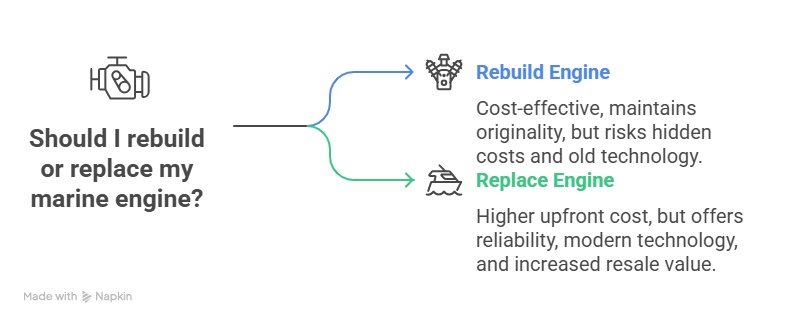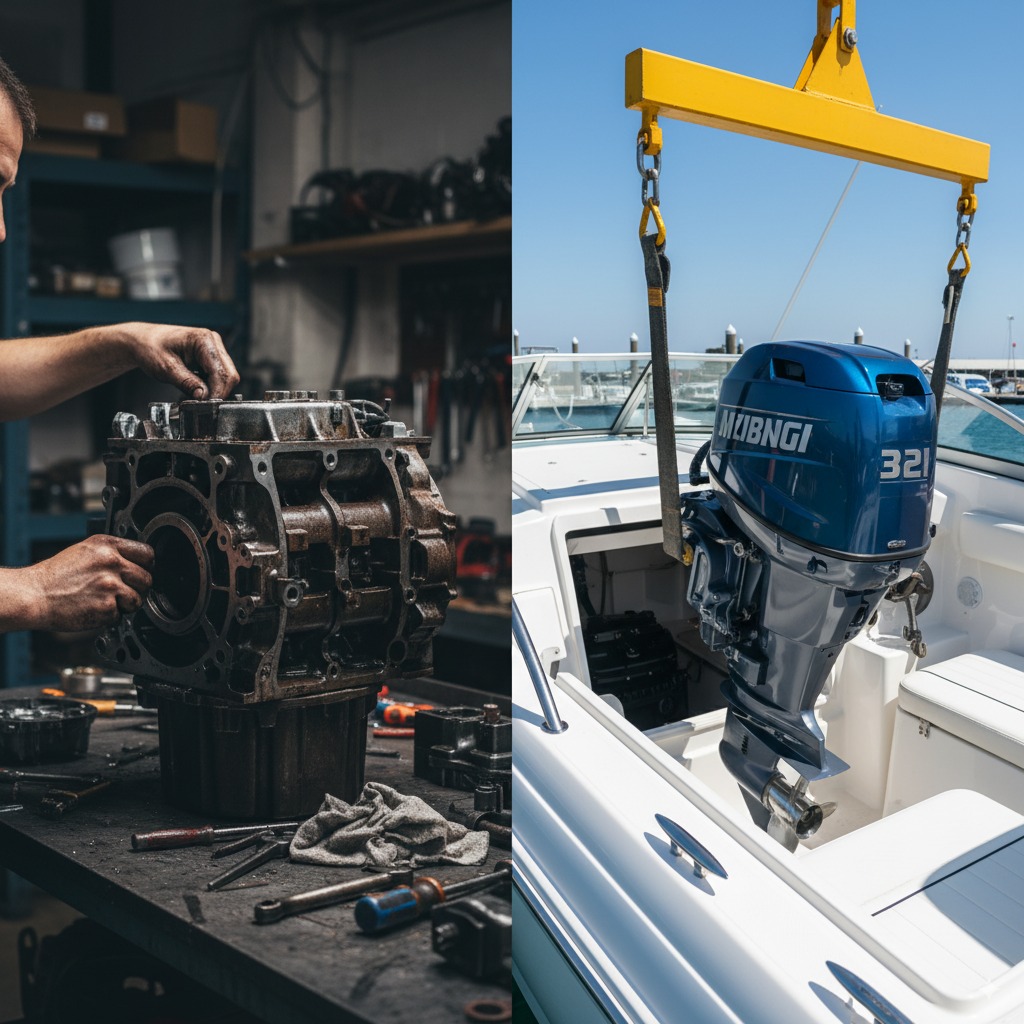I’ve been a marine mechanic in South Florida for over 15 years, and I’ve seen that look on a boat owner’s face a hundred times. It’s a mix of dread and confusion that comes right after I deliver the bad news: their engine has a serious problem. The silence that follows is always filled with the same unspoken question: “Do I fix this thing, or is it time to bite the bullet and get a new one?” This is the ultimate Marine Engine Repair vs. Replacement dilemma, and it’s a heavy one.
I remember a guy named Frank with a classic 25-foot Mako. He loved that boat, but its old two-stroke was tired. After it left him stranded for the third time, he was at that crossroads. A rebuild seemed cheaper upfront, but I had to be honest with him. We could fix it, but he’d still have a 20-year-old engine with 20-year-old technology. We talked it through, and he decided on a repower with a new four-stroke. A few months later, he told me it was the best money he’d ever spent on the boat. It was quieter, more fuel-efficient, and most importantly, he trusted it again.
That’s what this decision is all about: trust. It’s not just about the money; it’s about your peace of mind when you’re miles from shore. In this guide, I’m going to break down the real-world pros and cons of Marine Engine Repair vs. Replacement to help you make the right call for your boat and your boating life.
Table of Contents
The Rebuild Route: Giving Your Old Engine a Second Chance
A rebuild isn’t just a patch-up job. A proper rebuild means tearing the entire engine down to the block. Every piston, bearing, seal, and gasket gets inspected and replaced. When it’s done right, you get your original engine back, running to factory specs.
Why a Rebuild Can Make Sense
The biggest draw here is usually the upfront cost. A rebuild can run you anywhere from $4,000 to $12,000, which is often significantly less than a new engine. If you have a classic boat, a rebuild keeps it original. You know the engine’s history, and if the core of it—the block and crank—are solid, a rebuild can give it many more years of service. This is a solid argument in the Marine Engine Repair vs. Replacement debate for those on a tighter budget.
The Hidden Risks of a Rebuild
But here’s where it gets tricky. The initial quote for a rebuild is just an estimate. The real cost isn’t known until that engine is in pieces on my workshop floor. I’ve opened up engines that looked fine on the outside, only to find a hairline crack in the block or severe internal corrosion. Those are game-changers, and the price can escalate quickly.
You also have to remember that a rebuilt engine is still old technology. You won’t get the fuel efficiency, quiet operation, or easy diagnostics of a modern engine. Warranties on rebuilds are also usually much shorter and more limited than what you get with a new motor. The decision of Marine Engine Repair vs. Replacement often hinges on your tolerance for these kinds of risks.
The Repower Path: A Fresh Start for Your Boat
Repowering is exactly what it sounds like: pulling out the old engine and dropping in a brand new one. But it’s rarely just a simple swap. It often involves new engine mounts, a new transmission, new controls, and sometimes even modifications to the boat itself.
The Big Advantages of a New Engine
The number one reason to repower is reliability. A new engine comes with a factory warranty, sometimes for years. That’s huge for peace of mind. You also get all the benefits of modern technology:
- Better Fuel Economy: This can save you a significant amount of money over the life of the engine.
- More Power and Quieter Operation: Modern engines are engineering marvels.
- Advanced Diagnostics: Easy plug-and-play diagnostics make troubleshooting a breeze.
While the upfront cost is higher—think $10,000 to $30,000 or more—it’s a predictable cost. You know exactly what you’re paying for. This predictability is a major factor for many when considering Marine Engine Repair vs. Replacement.

The Downside of a Repower
The biggest hurdle is obviously the initial investment. It’s a lot of money. The installation can also be complex and time-consuming, meaning your boat could be out of the water for a while. For some classic boat purists, a new engine can also feel like it takes away from the boat’s originality. When it comes to Marine Engine Repair vs. Replacement, the higher cost is the most common reason people hesitate.
Side-by-Side: The Real-World Comparison
Let’s put the Marine Engine Repair vs. Replacement options head-to-head. I made this table based on the real conversations I have with my customers.
| Feature | Engine Rebuild | New Engine (Repower) |
|---|---|---|
| Upfront Cost | Lower ($4k – $12k) | Higher ($10k – $30k+) |
| Cost Predictability | Low (Hidden issues are common) | High (Fixed price) |
| Performance | Restores original performance | Modern, improved performance |
| Fuel Efficiency | No improvement | Significant improvement |
| Warranty | Limited (Often 90 days to 1 year) | Comprehensive (Multi-year) |
| Technology | Old | Modern (Digital controls, diagnostics) |
| Resale Value | Minor impact | Significant increase |
| Best For… | Tighter budgets, classic boats, owners who accept some risk. | Long-term owners, those who prioritize reliability and modern tech. |
More Than Just the Engine: Other Things to Consider
The choice of Marine Engine Repair vs. Replacement isn’t just about the motor. You have to look at the whole boat.
- Hull and Systems: Does it make sense to put a brand new $20,000 engine in a boat with a rotten transom or corroded wiring? A new engine deserves a solid boat.
- Your Boating Style: Are you a weekend cruiser, or are you running offshore every chance you get? If you depend on your boat for serious fishing or long trips, the reliability of a new engine is often worth the investment.
- How Long You’ll Keep the Boat: If you plan on selling in a year or two, a rebuild might be enough. If this is your forever boat, a repower is a long-term investment in your future enjoyment.
FAQ: Questions I Get Asked All the Time
How many hours is “too many” on a marine engine?
There’s no magic number, but for most gas inboards, I start getting cautious around 1,500-2,000 hours. For diesels, it can be much higher, maybe 5,000-8,000 hours. But it all depends on how it was maintained. This is a key factor in the Marine Engine Repair vs. Replacement decision.
Can a rebuild really be as good as new?
If it’s done by a meticulous, experienced mechanic with quality parts, a rebuilt engine can be very reliable. But it will never be “new.” It’s still based on old technology.
Will a new engine increase my boat’s value?
Absolutely. A new, warrantied engine is a huge selling point and can significantly boost the resale value, often more than the cost of the repower itself. This is a critical point when debating Marine Engine Repair vs. Replacement.
What’s the biggest hidden cost in a rebuild?
Finding out the block is cracked or there’s major corrosion that wasn’t visible from the outside. That can turn a “repair” into a “replace” decision very quickly.
How do I start the decision process?
Get a professional diagnosis first. Pay a good mechanic for a thorough inspection and compression test. You need to know exactly what you’re dealing with before you can make an informed choice between Marine Engine Repair vs. Replacement.
Key Takeaways: My Final Thoughts
Alright, let’s wrap this up. The Marine Engine Repair vs. Replacement debate doesn’t have one right answer. It’s a personal decision based on your boat, your budget, and your tolerance for risk. But after all my years in the shop, here’s my gut advice:
- A Rebuild is a Bet on the Past: You’re betting that the core of your old engine is sound and that a refresh will keep it going. It’s a good option if your budget is tight and you’re okay with the technology of yesteryear.
- A Repower is an Investment in the Future: You’re paying for reliability, modern technology, and peace of mind. If you plan on keeping your boat for the long haul and want a worry-free experience, this is almost always the better choice.
- Don’t Let the Upfront Cost Fool You: Look at the Total Cost of Ownership. The fuel savings and lower maintenance of a new engine can close the price gap over a few seasons.
- Trust Your Gut (and Your Mechanic): Get an expert opinion, but also think about what will make you feel confident when you’re offshore. That peace of mind is priceless.
Ultimately, the goal is to keep you on the water, enjoying your boat. Make the choice that best supports that goal.
Author Bio
I’m Alex, a 15-year marine technician in South Florida, ABYC-certified. I’ve guided hundreds of boat owners through the tough Marine Engine Repair vs. Replacement decision. From rebuilding classic MerCruisers to repowering commercial fishing boats, I’ve seen it all at marinas like Dinner Key and Bahia Mar, helping boaters make the smart choice for their vessel and their wallet.


Leave a Reply